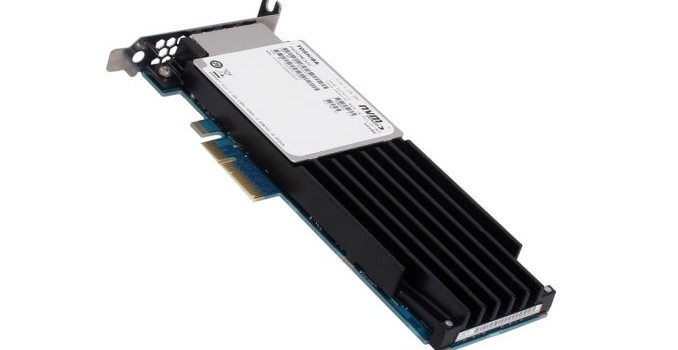Toshiba Announces Three New NVMe SSD Families
On the eve of Flash Memory Summit (August 11-13), Toshiba has announced a full range of NVMe-based PCIe SSDs using Toshiba controllers and Toshiba MLC flash.
| Toshiba NVMe Drive Families | |||
| Drive Series | PX04P | XG3 | BG1 |
| Form Factors and Interface | PCIe 3.0 x4 HHHL / 2.5” U.2 |
PCIe 3.1 x4 M.2 2280 / 2.5” SATA Express | M.2 2230 / 16mm*20mm soldered module "M.2 1620" |
| Capacities | 800 GB, 1600 GB, 3200 GB | Up to 1024GB | Up to 256 GB |
| QSBC Error Correction | Yes | Yes | No |
| TCG Pyrite Security | No | Yes | Yes |
| Sequential Read | 3100 MB/s | ? | ? |
| Sequential Write | 2350 MB/s | ? | ? |
| 4kB Random Read IOPS | 660k | ? | ? |
| 4kB Random Write IOPS | 185k | ? | ? |
For the enterprise market, the PX04P series complements the SAS-based PX04S drives announced last week. The PX04P is available as a 2.5” drive with a U.2 (SFF-8639) connector, or as a PCIe expansion card. In either case, the drive supports four lanes of PCIe 3.0 and can make good use of that bandwidth to offer up to 3.1 GB/s sequential read speeds. With an endurance rating of 10 drive writes per day it is intended for relatively write-heavy workloads.
For the high-performance client market, the XG3 is available in the M.2 2280 form factor using four lanes of PCIe 3.1, or as a 2.5” drive using the two-lane SATA Express connector. If these drives make it in to the retail channel, it means that consumers whose motherboards have a SATA Express connector but no M.2 slot will finally have an easy way to get in on the PCIe storage revolution.
For tablets and ultra-thin laptops, the BG1 is optimized for low power in very small packages. It comes as either an M.2 2230 card or a soldered-down module measuring 16mm by 20mm. The BG1's maximum capacity is only 256 GB, and given the power and size constraints it is probably not using a 4-lane PCIe connection.
The two client drive families implement support for the Trusted Computing Group Pyrite standard, a subset of TCG Opal that includes features necessary for things like secure boot but does not include encryption.



